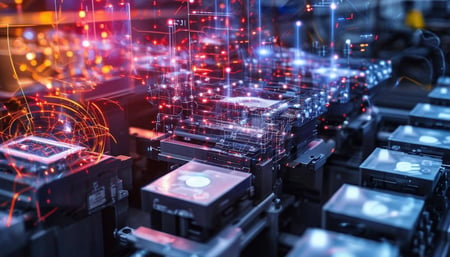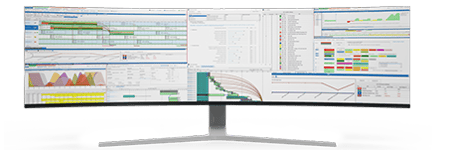Generative AI and Intelligent Automation
As the packaging manufacturing industry faces new challenges, from supply chain disruptions to escalating operational costs, the role of advanced technology has become increasingly pivotal. For Operations Directors in this space, harnessing the power of generative AI and intelligent automation presents an opportunity to drive unprecedented efficiency, agility, and precision in daily operations. Integrating solutions like PlanetTogether with ERP systems such as SAP, Oracle, Microsoft, Kinaxis, and Aveva can significantly amplify these benefits, providing real-time insights, predictive capabilities, and automated workflows that transform operations.
In this blog, we’ll explore how generative AI and intelligent automation reshape the packaging manufacturing landscape, improve efficiency, and enhance decision-making.

Generative AI in Packaging Manufacturing
Generative AI, a branch of artificial intelligence capable of creating new content, ideas, and solutions, has begun to make waves in manufacturing. For packaging, generative AI helps companies optimize designs, streamline operations, and improve product quality. By leveraging historical data and predictive modeling, generative AI enables the creation of simulations and designs that minimize material waste, optimize packaging for logistics, and even anticipate design trends for product differentiation.
Here are key applications of generative AI in packaging manufacturing:
Optimized Packaging Design: Generative AI tools can analyze constraints like material availability, customer specifications, and sustainability goals to generate optimized packaging designs. This capability helps in creating cost-effective and environmentally friendly packages while maintaining quality standards.
Production Process Optimization: AI-driven models can analyze data across various production stages to identify inefficiencies. Generative AI then offers potential configurations and adjustments that enhance process flows, reduce downtime, and minimize material waste.
Demand Forecasting and Inventory Planning: Generative AI, when integrated with planning software like PlanetTogether, provides accurate demand forecasts and inventory requirements, enabling manufacturers to maintain optimal stock levels and avoid costly overproduction.

Intelligent Automation: Redefining Efficiency and Precision
Intelligent automation combines AI, machine learning, and robotic process automation (RPA) to streamline repetitive tasks and enhance decision-making processes. In packaging manufacturing, this technology enables automated workflows across procurement, production, and logistics, which allows for reduced lead times and higher operational flexibility.
Key areas where intelligent automation can have a significant impact:
Automated Scheduling and Resource Allocation: Operations Directors often face complex challenges in managing resources effectively. Through intelligent automation, systems like PlanetTogether can be integrated with ERP platforms like SAP or Oracle, enabling automatic adjustment of production schedules based on real-time data, machine availability, and workforce constraints. This flexibility results in fewer bottlenecks and optimized resource utilization.
Predictive Maintenance and Downtime Reduction: Packaging manufacturing equipment is highly specialized and costly to repair. Intelligent automation can help monitor equipment conditions in real-time, predict potential failures, and initiate maintenance actions before downtime occurs. Integrating this capability with ERP systems like Microsoft or Aveva ensures seamless communication between maintenance and production, maximizing uptime.
Automated Quality Control: Quality standards are critical in packaging manufacturing, where any defect could lead to wasted materials and dissatisfied customers. Intelligent automation can inspect packaging materials, components, and final products in real-time, ensuring they meet regulatory standards. Integrating this data with a platform like Kinaxis allows Operations Directors to adjust processes dynamically to maintain quality.
![]()

Leveraging PlanetTogether’s Integration with ERP Systems
For Operations Directors aiming to capitalize on generative AI and intelligent automation, leveraging an advanced planning and scheduling system like PlanetTogether offers substantial benefits. Integrating PlanetTogether with ERP systems—such as SAP, Oracle, Microsoft, Kinaxis, or Aveva—enables seamless data flow and unified visibility across operations, which is essential for maintaining real-time control and oversight.
Here’s how integrating PlanetTogether with these ERP systems supports generative AI and intelligent automation:
Enhanced Data Synchronization: With the integration of PlanetTogether and ERP systems, all critical data—whether related to materials, inventory, or production schedules—is synchronized across platforms. This synchronization facilitates the use of generative AI to analyze historical patterns, assess current production capacities, and generate optimized scheduling and inventory plans.
Real-Time Decision-Making: Integration with ERP systems allows Operations Directors to receive real-time insights into production and inventory. Combined with generative AI capabilities, this data helps in making immediate adjustments to production plans in response to demand fluctuations, material shortages, or equipment issues.
Unified Analytics for Predictive Maintenance: Integrating predictive maintenance data within PlanetTogether, alongside an ERP system, allows AI-driven algorithms to evaluate machine health in real-time, predict failures, and automate maintenance scheduling. This ensures the machinery is always in peak condition, reducing unplanned downtime and optimizing production.
Streamlined Collaboration Across Departments: By linking PlanetTogether and ERP systems, departments from supply chain to production can access real-time data and updates, allowing for more cohesive planning. Generative AI can then assist in creating workflows that automatically coordinate tasks between teams, ensuring that everyone operates with a single source of truth.

Practical Benefits of Generative AI and Intelligent Automation
With these integrations and technologies in place, packaging manufacturing facilities can achieve tangible improvements in key performance areas:
Increased Throughput and Reduced Cycle Times: Generative AI-driven optimizations in design and intelligent automation in scheduling reduce cycle times and increase throughput. Packaging facilities can fulfill orders faster, respond quickly to custom requests, and maintain high productivity even during peak demand periods.
Waste Reduction and Cost Savings: By automating quality control and optimizing material usage through generative design, packaging manufacturers can significantly reduce waste. This not only lowers material costs but also supports sustainability initiatives, making operations more eco-friendly.
Improved Customer Satisfaction: Intelligent automation enhances order accuracy, while generative AI allows for more customization. This level of precision and flexibility leads to higher customer satisfaction, with orders that consistently meet specifications and delivery timelines.
Enhanced Workforce Productivity: Automating repetitive tasks allows the workforce to focus on high-value activities, such as innovation and quality improvement. By leveraging AI to handle scheduling, quality control, and maintenance planning, packaging facilities can maximize the efficiency of their human resources.
Scalability and Agility: Generative AI and intelligent automation enable packaging facilities to scale operations seamlessly. As demand fluctuates, the integration of these technologies allows quick adjustments to production schedules, inventory levels, and resource allocation, ensuring the facility can respond to market changes swiftly.
As the technology landscape continues to evolve, generative AI and intelligent automation will unlock new avenues for Operations Directors in packaging manufacturing. Advanced capabilities like autonomous decision-making, adaptive planning, and predictive customer insights will soon become accessible as these technologies mature.
For instance, integrating PlanetTogether with an AI-powered ERP system could enable autonomous production scheduling, where the system analyzes real-time data from sales, supply chain, and production to dynamically adjust schedules without human intervention. Likewise, as generative AI models become more sophisticated, they will be able to develop packaging designs that not only meet practical specifications but also align with emerging market trends and consumer preferences.
Key Considerations for Implementation
While the benefits of generative AI and intelligent automation are evident, successful implementation requires strategic planning. Here are a few considerations:
Data Management and Integration: Effective AI requires comprehensive, high-quality data. Operations Directors should ensure that data management practices are robust and that ERP integration with PlanetTogether is seamless, enabling clean data flow and accurate analysis.
Change Management: Introducing automation and AI can impact workforce dynamics. A well-structured change management plan is essential to prepare teams for new roles, responsibilities, and workflows.
Scalability and Flexibility: Technology should be scalable and adaptable to future changes. Solutions like PlanetTogether, when integrated with ERP systems, offer a flexible framework that can be expanded as new AI capabilities are introduced.
Cybersecurity and Compliance: AI and automation bring new risks related to data security. Working closely with IT teams and ensuring compliance with industry regulations are critical to safeguard operations.
Generative AI and intelligent automation represent transformative forces in the packaging manufacturing industry, empowering Operations Directors to achieve new levels of efficiency, quality, and responsiveness. By integrating tools like PlanetTogether with ERP platforms such as SAP, Oracle, Microsoft, Kinaxis, or Aveva, packaging facilities can harness real-time data and advanced analytics to make smarter, faster decisions.
Their impact on packaging manufacturing will only deepen, providing an opportunity for forward-thinking Operations Directors to lead their organizations into an era of intelligent, agile, and data-driven operations. Embracing these innovations today will ensure a competitive edge tomorrow, creating a pathway to more resilient, efficient, and sustainable manufacturing processes.
Are you ready to take your manufacturing operations to the next level? Contact us today to learn more about how PlanetTogether can help you achieve your goals and drive success in your industry.
Topics: PlanetTogether Software, Integrating PlanetTogether, Enhanced Data Synchronization, Packaging Manufacturing, Optimized Packaging Design, Production Process Optimization, Enhanced Workforce Productivity, Streamlined Collaboration Across Departments, Increased Throughput and Reduced Cycle Times




















LEAVE A COMMENT